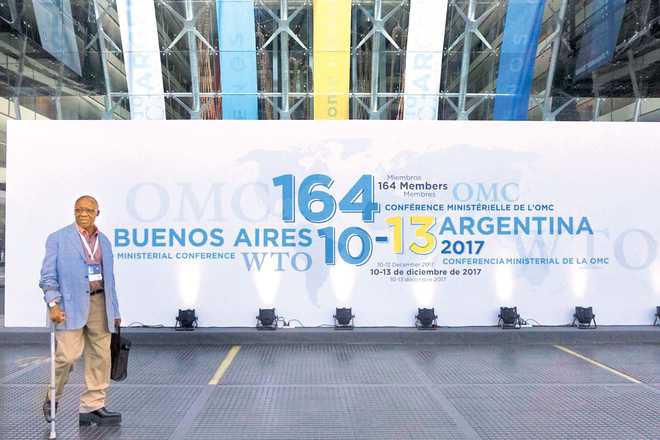
A delegate walks past the entrance to the 11th Ministerial Conference of the WTO in Buenos Aires, Argentina, on Sunday. AFP
Sucha Singh Gill
Professor, CRRID, Chandigarh
DEVELOPING countries did not understand the full implications of the Agreement on Agriculture (AOA) while signing the General Agreement on Tariffs and Trade (GATT) in 1994 that led to the formation of WTO the next year. It was agreed under the AOA that price support, including input subsidies, led to market distortions, therefore, they were to be limited to the 20 per cent of the value of produce. This was to be calculated as a difference between the support price minus the international reference price (average of 1986-88) in dollar terms. Subsidies beyond this limit would invite punitive action. At the same time, countries could resort to public stockholding of foodgrains as food aid for nutritional objective for the poor, but this was restricted to 10 per cent of the total value of domestic production. The procurement was also exempted from the 20 per cent subsidy limit.
Green, Blue and Amber boxes
The subsidies in agriculture were divided into three categories — 1. Green Box or environmentally beneficial Green Box subsidies, 2. Blue Box subsidies for reduction in production and 3. Amber Box subsidies for encouraging production. The first two categories were exempted from any limit. Interestingly, most of the subsidies of the developed countries were in these two categories. But the Green Box subsidies were put in the category of reductionable subsidies. The subsidies provided by the developing countries were in this category. A decade after WTO formation, the developing countries realised the adverse implication of grading subsidies: these provisions inhibited investments in agriculture and achievement of food security. This forced developing countries to join hands to get changes in these rules.
At the Bali Ministerial in 2013, a group of 33 developing countries wanted to amend AOA to shift subsidies for public stockholding of grains from the Amber Box to the Green Box. Pressure from countries like India and China led to a Peace Clause exempted subsidies on account of public stockholding from any complaint at WTO till a permanent solution was reached at the 2017 Ministerial Conference, ie the 11th Ministerial Conference (MC11), scheduled for December 10-13, 2017 at Buenos Aires.
At the General Council meeting of the WTO in 2014, India took a tough position. It refused to proceed with adopting the Trade Felicitation Text (extension of WTO agenda) till a permanent resolution of the issue of public stockholding of foodgrains was achieved. Compared to this resolute stance, Commerce Minister Suresh Prabhu is taking a soft line by refusing to make a permanent solution on public stockholding at the MC11 a “prestige issue”.
Looming threat for India
It is apparent that there is no indefinite assurance to India or other developing countries for public stockholding of grains beyond 10 per cent of production after 2017. It is, therefore, important that India understands the looming threat to its food procurement and agriculture and make preparations to protect the farmer. As per the provisions of the WTO, India will be allowed to procure 20-22 million tonnes of foodgrain against the present level of over 50 million tonnes. If the Food Security Act 2013 is implemented, India's procurement requirement could exceed 60 million tonnes.
India and other developing countries are pitted against the US, the EU and Australia which are better prepared and possess capacity to manoeuvre proceedings. They are the biggest subsidisers who have managed to keep their subsidies in the Green and Blue boxes and pushed subsidies of developing countries in the Amber box. They are also host to big corporations like Cargill, Tyson, BRF, and Monsanto, which have a deep interest in the trade of foodgrains. Non-resolution of the public stockholding issue is likely to create a serious crisis in states like Punjab, Haryana, UP and Andhra Pradesh, the foodgrains-surplus producing states. Prices will crash and farmers will face crises and gluts at the time of harvesting in the absence of sufficient procurement by the government agencies. Such crises are common with vegetable and horticulture crops in the country. The Punjab farmers faced a similar crisis in 2016 in the case of PB 1509 Basmati rice when its price crashed and farmers blocked major roads in the state.
Cooperative federalism
There is talk of cooperative federalism in the country. The Fourteenth Finance Commission suggested that each level of the government takes decisions independently but an exchange of views is necessary before taking a decision that impacts the other. In this context, it recommended that such issues be discussed at the Inter-State Council.
Interestingly, agriculture is a state subject, about which a decision going to take place at the international level with the involvement of the Government of India without the consultation of the states concerned. This has created a situation of non-seriousness at the level of the Union government, with adverse implications for several states. Even kisan unions, which have shown some mobilisation at the national level, unfortunately, have not shown any concern. Without pressure of the stakeholders the interests of the farmers and farming community will be adversely affected.



























